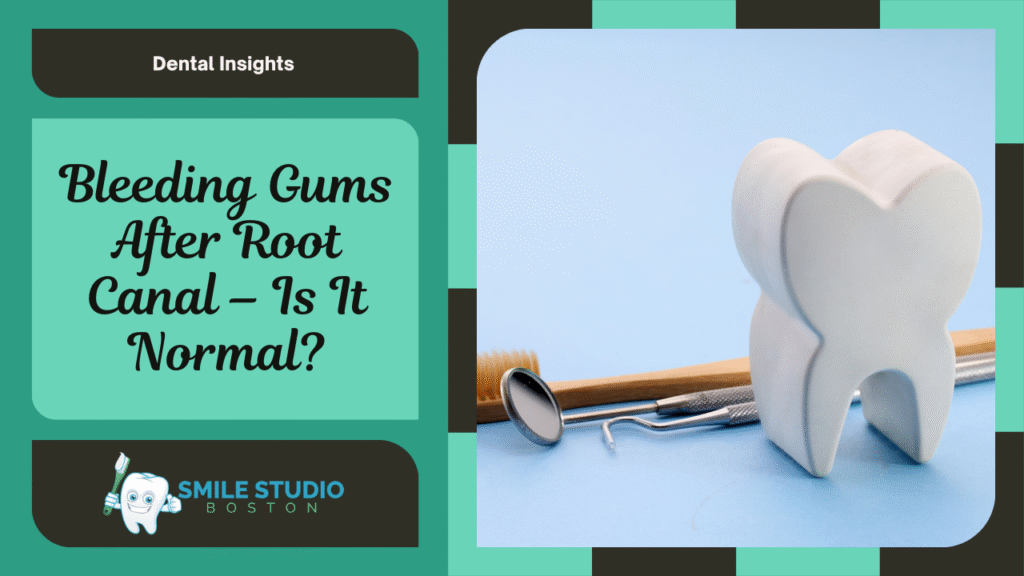A root canal is a common dental procedure designed to save a severely damaged or infected tooth. While the treatment itself is meant to relieve pain and prevent further infection, some patients may experience bleeding gums after a root canal. This can raise concerns, leaving many to wonder, “Why is my root canal bleeding?”
In most cases, bleeding gums after root canal is normal and should subside within a day or two. However, persistent or excessive bleeding could signal an underlying issue that requires professional attention. Understanding the causes and knowing when to seek help is essential for a smooth recovery.
I. Understanding Root Canal Bleeding
A root canal procedure involves removing infected pulp from inside the tooth, disinfecting the area, and sealing it to prevent further decay. While it is a routine treatment, some bleeding canal cases occur due to irritation or sensitivity in the surrounding tissues.
- Normal bleeding: Light bleeding or pinkish saliva for a few hours post-procedure.
- Abnormal bleeding: Persistent or heavy bleeding lasting more than 24-48 hours, often accompanied by swelling or discomfort.
If bleeding gums after a root canal continue beyond the expected recovery period, consulting your dentist is crucial.
II. Causes of Bleeding Gums After Root Canal
Several factors can contribute to root canal bleeding, including:
1. Tissue Irritation or Trauma
The use of dental instruments during the procedure may cause minor irritation to the surrounding gums, leading to bleeding canal symptoms. This typically resolves within a day.
2. Gum Infection or Re-Infection
If bacteria remain in the treated area or if oral hygiene is neglected, a secondary infection can develop, causing bleeding gums after root canal treatment.
3. Incomplete Pulp Removal
In rare cases, residual infected tissue left behind during the procedure can trigger inflammation, pain, and root canal bleeding.
4. Blood Thinners or Medical Conditions
Patients on blood-thinning medications or those with clotting disorders may experience prolonged bleeding canal issues after dental procedures.
5. Poor Oral Hygiene Post-Treatment
Failing to maintain proper oral hygiene can lead to plaque buildup, further irritating the gums and contributing to bleeding gums after root canal treatment.
III. When to Seek Dental Care
While mild root canal bleeding is expected, certain symptoms indicate a more serious issue. Seek professional care if:
✅ Bleeding persists beyond 48 hours.
✅ You notice swelling, pus, or a foul odor—these are possible signs of infection.
✅ You experience severe pain that does not improve with medication.
A dentist will evaluate the situation and recommend appropriate treatment, such as antibiotics, additional cleaning, or even retreatment if necessary.
IV. How to Prevent Bleeding Gums After a Root Canal
Immediate Post-Treatment Care
✔ Avoid hard, crunchy, or spicy foods for the first few days.
✔ Use a soft-bristled toothbrush to prevent irritation.
✔ Follow all aftercare instructions provided by your dentist.
✔Brush and floss gently to prevent gum irritation.
✔ Schedule regular dental check-ups to ensure proper healing.
Lifestyle Adjustments
❌ Avoid smoking and alcohol, as they can delay healing and worsen bleeding gums after a root canal.
❌ Reduce stress, which can impact gum health and recovery.
V. Transform Your Smile with SmileStudio!
Minor root canal bleeding is typically nothing to worry about, but persistent bleeding canal issues should not be ignored. If you ask, “Why is my root canal bleeding?” it may be time to consult a dental professional.
At SmileStudio, we provide expert care for bleeding gums after root canal treatment and other dental concerns. If you’re experiencing prolonged bleeding or discomfort, book an appointment with our Boston dental specialists today!
At SmileStudio, everyone deserves a confident, healthy smile. Whether you need routine care, cosmetic enhancements, or emergency treatment, our expert team is here.
Why Choose Us?
✔ Top-Rated Dentists – Specialists in crowns, veneers, and implants
✔ Flexible Payment Plans – Quality care that fits your budget
✔ Emergency Services – Immediate care when you need it most
✔ Walk-Ins Welcome – Convenient and hassle-free scheduling
✔ MassHealth Accepted – Affordable care for all insurance plans
Book Your Appointment Today!
📞 Call: +1 (617) 265-5606
🌐 Visit: SmileStudioBoston.com
📍 Location: 1428 Dorchester Ave, Dorchester, MA 02122
At SmileStudio, your smile is our priority. Don’t wait—schedule your appointment today and take the first step toward a healthier, more radiant smile!
FAQs
1. Is it normal to have bleeding gums after a root canal?
Some minor root canal bleeding immediately after the procedure is normal. However, persistent bleeding beyond 24-48 hours may indicate an underlying issue.
2. Why is my root canal bleeding after a few days?
If you notice bleeding gums after a root canal, it may be due to tissue irritation, infection, or incomplete pulp removal. Consulting your dentist is recommended.
3. What should I do if my root canal is still bleeding?
Apply gentle pressure with sterile gauze, avoid hard foods, and maintain good oral hygiene. If bleeding persists, schedule a dental check-up immediately.
4. Can an infection cause bleeding after a root canal?
Yes. A re-infection or an untreated bleeding canal can lead to swelling, pus, and continued bleeding. Seek professional help if you experience these symptoms.
5. How can I prevent post-root canal bleeding?
Follow post-treatment care instructions, avoid smoking and alcohol, and maintain regular dental visits to ensure proper healing.


